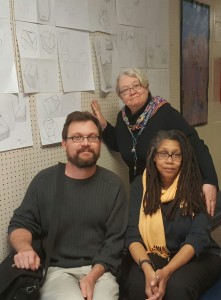At Saint Augustine’s University, faculty and administrators try to teach students new concepts and ideas, and encourage them to learn and to think for themselves.
Sometimes those lessons are best taught outside of the classroom.
That has been the case in the past year with the presidential election being at the forefront of the news. University leaders have encouraged students to become involved in the political process. For example, President Everett B. Ward and other administrators in November lead students in a march to the polls to vote, and in October Dr. Zaphon Wilson, Dean of the School of Social and Behavioral Sciences and Professor of Political Science, hosted a forum for local political candidates at the MLK Building.
The political involvement has not stopped since the election. Donald Trump has turned out to be an extremely controversial president. His election has sparked unrest not only in the United States but across the globe. People are getting out in the streets, demonstrating and protesting his policies and statements.
The Falcon community has been a part of that movement, and it is coming from an unexpected place: the Department of Visual and Performing Arts. Three faculty members from that department – Linda Dallas, Virginia Tyler, and Michael Bissinger – have been very active in the protests against President Trump.
Ms. Tyler attended the Women’s March on Washington on Jan. 21, while Ms. Dallas participated in the Women’s March on Raleigh, NC, held on the same day. Ms. Tyler also attended the 11th Annual Moral March on Raleigh on Feb. 11, along with Mr. Bissinger. Mr. Bissinger and Ms. Tyler were both at the demonstration at Raleigh-Durham International Airport on Jan. 31 to protest Pres. Trump’s ban on immigrants from seven Muslim-majority nations.
Although the protests were not part of any courses taught here at Saint Augustine’s University, the faculty members all said there were lessons that could be learned from their activism.
For Mr. Bissinger, taking part in the protests was a way of being part of the debate over important issues facing the nation. It’s important for people to show the Trump Administration that they must engage all Americans in solutions to our problems, he said.
“I am not going to just let you have what you want,” Mr. Bissinger said. “That was why people were there. …Failure to engage and participate means that [government officials] don’t have to include you” when coming up with solutions, he added.
It was important to Ms. Tyler that the protests were peaceful. “Events like these demonstrations are a way to voice your opinion in a civilized way,” she said. “This grassroots type of demonstration and the idea of leading from below is the do-it-yourself tactic.”
Being there is nothing like watching the events on the news, Ms. Dallas added. “You get to hear great speakers, and see things that you would not see on TV,” she said.
It is not odd that the protest leaders on campus are coming from the visual arts faculty – in fact, it makes sense because of the emphasis on self-expression in art, Ms. Tyler said. “Art includes activism,” she said. “It may not change the world, however it makes us stronger.”
Ms. Dallas was motivated to attend the protests by her belief that Trump’s election may erode women’s rights. While a candidate, a tape surfaced in which Trump bragged about sexually assaulting women. Trump also made disparaging remarks about Carly Fiorina, another presidential candidate, and about the wife of candidate Ted Cruz. He also admitted to walking in on beauty contest contestants while they were dressing and was accused by a number of women of groping and other incidents of sexual assualt in the past.
“I could not believe Trump won, that we have a president who made not only disrespectful comments about us but also took actions,” Ms. Dallas said. “The idea that we have higher standards for entertainers than the president is disturbing.”
Mr. Bissinger attended the demonstration at RDU airport in protest of the Muslim ban. He was particularly unhappy that it kept out Syrian refugees, who are fleeing war, violence and starvation. “I can’t stay at home when these policies do not need to exist,” he said. “I do not have to give my approval. …You know that refugees actually do not have much choice. It is not easy to get relocated and there are only a certain number of countries that may accept them from different places around the world.”
Mr. Bissinger also said Mr. Trump, who did not condemn and at times even encouraged violence from supporters against protestors during his campaign rallies, has set a bad example. “The KKK’s idea of having a parade in Raleigh is setting the tone that they now think that Donald Trump validates and empowers them to have these ideas,” he said. “You can’t allow this and allow them to stick their heads through the shadows.”
The faculty say their activism is not just for teaching lessons. “This type of protest will evoke change. That is why you want to protest,” Ms. Dallas said.
Ms. Tyler wanted SAU students to know that there is a protest every Tuesday at 11 a.m. in front of the office of Thom Tillis, U.S. Senator for North Carolina. She added: “His office is just down the street.”
— Jazmin Powell


